In this article, you’ll learn how to choose professional and budget wireless mics – among the most popular wireless systems on the market to date. I will use those as reference and familiarize you with common distinctions as well as concepts. No prior knowledge or experience is required, so all the information given is going to be beginner-friendly. Afterwards, you will be able to make the right choice easily and in accordance with your specific needs. Ideally, you want to purchase from Rode, Sennheiser, Audio-Technica and Shure. Those are good for semi-professional application and offer a variety of interchangeable parts for replacements and upgrades.
Defining budget
Well what about the budget wireless mics you may think? First, the four brands I mentioned are actually consumer-friendly. In professional circles, they will often use brands like Lectrosonics for comparison, whose wireless transmitters range from around $3000-$6000. Thus, when I’m pointing you to anything sub $1000 it actually isn’t that bad in terms of budget. They are still costly, just like all audio equipment, but at least it’s better to be realistic than delusional. Having said that, there are still a lot of users who don’t really need the quality nor reliability. That’s why I’ve made a second list, which includes wireless mics of dirty cheap, angry and unknown brands.
Transmitter types
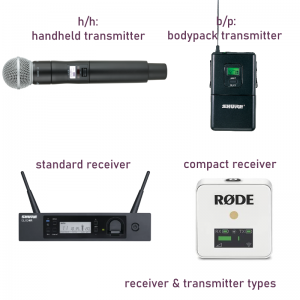 All right, that was about the intro and now I’m going to cover some of the important distinctions. Any wireless mic requires two components, the receiver and the transmitter. Transmitters can be generally divided into two, the bodypacks and handhelds. Handhelds look like stage mics with no wires attached; a miniature transmitter circuit is embedded into the mic’s handle. They come with switchable capsules, which can be bought separately in order to change the properties of the mic. Now the bodypacks are little boxes fixed on your waist. They are used in combination with miniature mics also known as lavaliers – visible, concealed and headworn varieties.
All right, that was about the intro and now I’m going to cover some of the important distinctions. Any wireless mic requires two components, the receiver and the transmitter. Transmitters can be generally divided into two, the bodypacks and handhelds. Handhelds look like stage mics with no wires attached; a miniature transmitter circuit is embedded into the mic’s handle. They come with switchable capsules, which can be bought separately in order to change the properties of the mic. Now the bodypacks are little boxes fixed on your waist. They are used in combination with miniature mics also known as lavaliers – visible, concealed and headworn varieties.
Receiver types
I always point out that the transmitter type should be decided first, depending on your application and not the other way around. The choice usually comes down to a bodypack + lavalier or handheld. Then, decide on the type of receiver. Here once again, we are usually presented with two options: on camera and non-camera receivers. Obviously, the on-camera solutions must be minimalistic or at least compact enough for a comfortable placement. You don’t want to use bulky and awkward monstrosities with bulging antennas for a comfortable use. If your camera or recorder has an XLR input, you may want a receiver with an XLR output for optimal quality.
Connector types
Otherwise, you can always fallback to a more compact but unbalanced 3.5mm output. If you don’t care about portability, you should opt for a small rack-type receiver that does not have any space limitations and usually offers much more functionality, display features and capabilities. The connector types are a little bit out of scope of this publication, but some basic considerations to have in mind will also prove useful. Different brands use different mic connectors, so once you bought a particular transmitter you may be locked to a certain type of connector. Shure uses TA4F, Sennheiser 3.5mm locking, Rode 3.5mm and Audio Technica 4-pin.
Recommended options
Now if you’ve understood all of the above points, then you are ready to choose your wireless mic setup. The branded options given below are all reliable in terms of quality, so you can simply choose the ones that fit your needs. Although I would love them ordered, from best to worst, this isn’t going to be as straightforward. If there is an option to upgrade your mic to a higher tier capsule for a handheld, or a top lavalier mic, then opting for upgrade will have a direct impact on the sound and can tremendously improve performance, but will also naturally have to stretch your budget. However, all of these are great and you will get what you are paying for.
| Name / score | Receiver | Transmitter options | Notes | Min price* |
| Sennheiser EW 100 9.8/10 |
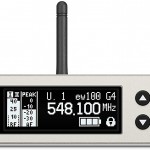 |
· b/p: ME2 · b/p: ME3 head · b/p: ME4 · b/p: instrument · b/p: ME2 +h/h · h/h: e835 · h/h: e845 · h/h: e865 · h/h: e935 · h/h: e945 |
Very versatile modern rack setup. For bodypack, ME2 is a viable omni lav, and e935 is an excellent handheld. |  Buy Now Buy Now
$699
( search amazon for other options)
|
| Sennheiser XSW 2 9.2/10 |
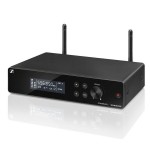 |
· b/p: ME2 · b/p: ME3 head · b/p: instrument · h/h: e835 · h/h: e865 |
More basic rack type from Sennheiser. Viable omni lav, cardioid + supercardioid handhelds. |  Buy Now Buy Now
$349
|
| Sennheiser XSW 1 8.8/10 |
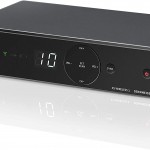 |
· b/p: ME2 · b/p: ME3 head · h/h: e825 · h/h: e835 |
Simple, cheap and affordable. Same omni lav and entry cardioid handheld. |  Buy Now Buy Now
$249
|
| Sennheiser AVX 9.2/10 |
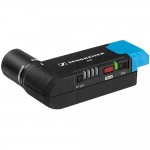 |
· b/p: ME2 · b/p: MKE2 · b/p: ME2 +h/h · h/h: e835 |
Advanced, compact receiver. MKE2 lavalier is especially amazing. |  Buy Now Buy Now
$699
|
| Shure GLXD24 9.4/10 |
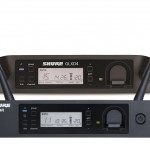 |
· h/h: Beta58A · h/h: Beta87A · h/h: SM58 · h/h: SM86 |
A very popular Shure transmitter in both standard and rack variations. Great choice of their signature capsules. |  Buy Now Buy Now
$499
|
| Shure GLXD14R 9.6/10 |
 |
· b/p: 98H/C · b/p: mx153 head · b/p: wl185 · b/p: wl93 |
Same as above but with bodypack mics. WL93 is a very good miniature mic and the MX153 is amazing. |  Buy Now Buy Now
$519
|
| Shure PGXD14 9.2/10 |
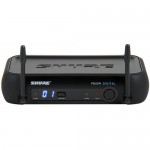 |
· b/p: wl93 | The cheaper version of the above, with a very good miniature mic WL93. |  Buy Now Buy Now
$???
Discontinued
|
| Shure BLX14R 9.4/10 |
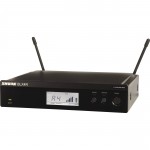 |
· b/p: mx153 head | The cheaper version with an amazing MX153 headset. |  Buy Now Buy Now
$549
|
| Audio-Technica ATW-21** 9.6/10 |
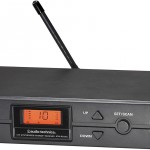 |
· b/p · b/p: cardioid · b/p: head · h/h |
Very simple, affordable wireless from AT with a basic cardioid lav, handheld and an expensive headmic. |  Buy Now Buy Now
$300
Phasing Out
|
| Rode Wireless GO II 9.6/10 |
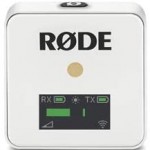 |
· 3.5mm | Very compact on-camera receiver and transmitter. |  Buy Now Buy Now
$209
|
| Rode RODELink 9/10 |
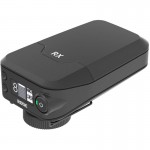 |
· b/p: XLR · h/h (wired) |
An unusual on-camera receiver that has a transmitter with XLR input and phantom power. |  Buy Now Buy Now
$???
Discontinued
|
* min price does not always represent the actual price, but merely an estimate. the price may vary due to availability, selected options and promos.
Budget options
Well as for the budget wireless, there are countless options but it’s hard to vouch for their quality. If you are buying a cheap one, you must be willing to take risks. Also, accept the restricted capabilities for upgrade or having to swap the whole set entirely, should they fail to meet your expectations. That said I have spent a lot of research, and relying to my experience was able to come up with a list of the most prominent ones here. Thus hoping to spare you from having to browse through all those heaps of buzzing and crackling trash piles of audio industry waste that could sound like a walkie-talkie, which accompany search results for any budget equipment.
| Name | Receiver | Transmitter options | Notes | Min price* |
| Xvive U3 9.2/10 |
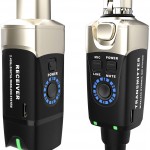 |
· b/p: XLR dyn. · b/p: XLR cond. |
Plug-on Microphone Wireless System for XLR mics. |  Buy Now Buy Now
$159
|
| TONOR TW820 9.2/10 |
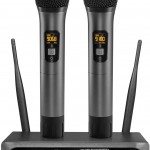 |
· h/h x2 | Basic pair of wireless mics from Tonor. |  Buy Now Buy Now
$109
|
| TONOR TW630 9.2/10 |
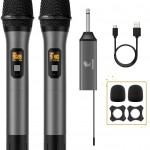 |
· h/h x2 | Similar but with a compact line-out receiver. |  Buy Now Buy Now
$59
|
| GTD Audio 2×800 9/10 |
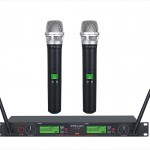 |
· h/h x2 | Pair of mics from GTD Audio. |  Buy Now Buy Now
$169
|
| GTD Audio 2×100 9.2/10 |
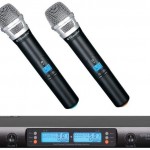 |
· h/h x2 | Another popular version from the same vendor. |  Buy Now Buy Now
$159
|
| Innopow 80 9/10 |
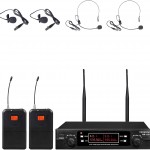 |
· b/p: lav+head x2 | A very cheap set of lav and head mics with 2 bodypacks. |  Buy Now Buy Now
$137
|
| Honhand wireless 9.4/10 |
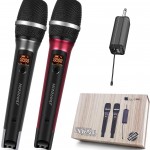 |
· h/h | Another very cheap mic with line out. |  Buy Now Buy Now
$60
|
| Lekato K380S 9.2/10 |
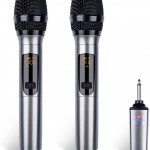 |
· h/h | A pair of wireless mics with line out. |  Buy Now Buy Now
$68
|
| Kithouse K380S 9/10 |
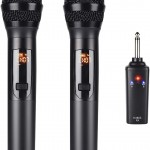 |
· h/h | This one is from Kithouse. Same mic, different looks. |  Buy Now Buy Now
$70
|
| BONAOK Wireless 9/10 |
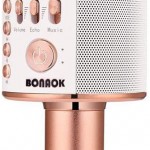 |
· h/h | Can you go wireless for $30 bucks? Yup, via Bluetooth. To hell with haters. |  Buy Now Buy Now
$30
|
Further reading
- 7 Best Headworn Mics for Wireless Systems Review
- Best Live Vocal Microphones
- Best Lapel Microphones
- All you need to know about wireless microphones

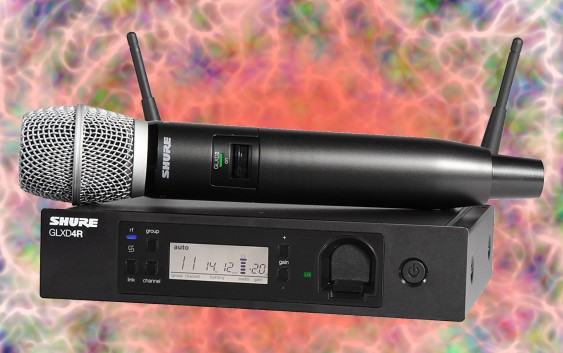
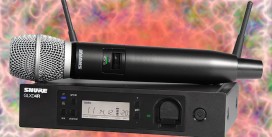





Thanks a lot, this helped me so much! I had to decide between Shure and Sennheiser, my go-to brands.
You’re welcome. The choice is simple, once again think of transmitter first. Choose the capsule or lav type of your preference, and automatically you know what system to buy. For those unfamiliar with the mic specs you can find their reviews among either head mic, lavalier or stage mic reviews. The links are included in the article by the way.
Whilst I found your articles on wireless microphones useful, i already own the Xvive unit you describe, i find it odd that you make no mention of the fact that most of the budget mics listed cannot be purchased with the appropriate crystal to operate legally on any free or licensable frequency across Europe. Most of the brands i have seen in your list appear only to be available set up to be legal in either the USA or Asia.
I like your list! Sennheiser and Shure are definitely the way to go—they offer a wide range of mic options and replacements. Other brands, not so much.